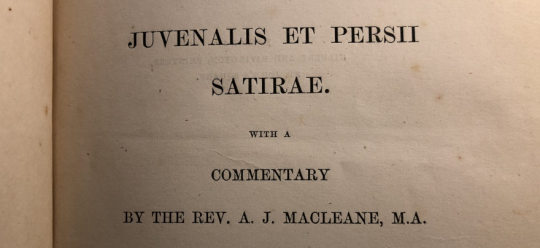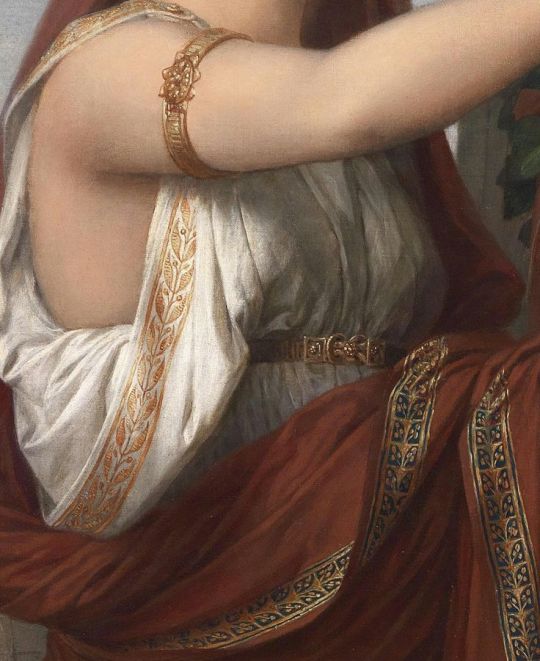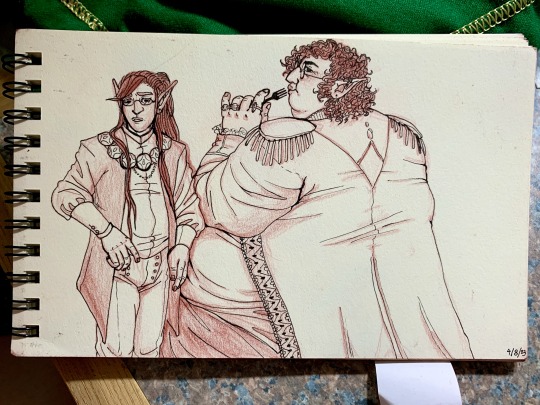#Iuvenalis
Explore tagged Tumblr posts
Text



I love it when the editor/commentator gets their knickers in a twist over the Romans' general lack of prudishness
#iuvenalis#juvenal#queueusque tandem abutere catilina patientia nostra#tagamemnon#dark academia#grey academia#chaotic academia#satura#poetry#latin#latin language#classic academia#classical studies#books#book photography#classics#ἐποίησα
24 notes
·
View notes
Text
Florilegium: Iuvenalis – Saturae
Satura I: De satura
Stulta est clementia, cum tot ubique vatibus occurras, periturae parcere chartae. (I, 17)
Es clemencia infructuosa conservar unos versos destinados a morir cuando por todos lados encuentras poetas.
Difficile est saturam non scribere. (I, 30)
Es difícil no escribir sátiras.
Probitas laudatur et alget. (I, 74)
La bondad es por todos laudada, pero muere de frío.
Si natura negat, facit indignatio versum. (I, 79)
Si la naturaleza lo niega, de la indignación nace el verso.
Inde ira et lacrimae. (I, 168)
De ahí la ira y las lágrimas.
Satura II: De hypocrise
Frontis nulla fides. (II, 8)
No tengas ninguna fe en las apariencias.
Quis tulerit Gracchos de seditione querentes? (II, 24)
¿Quién habría de soportar a los Gracos quejándose de sedición?
Sed illos defendit numerus iunctaeque umbone phalanges: magna inter molles concordia. (II, 46)
Pero en cuanto a éstos, los protege su número y sus unidas falanges escudo con escudo. Grande es la concordia entre los afeminados.
Dat veniam corvis, vexat censura columbas. (II, 63)
La censura perdona a los cuervos y castiga a las palomas.
Nemo repente fuit turpissimus. (II, 83)
Nadie de repente se vuelve el más indigno.
Nil animis in corpora iuris natura indulget. (II, 139)
La naturaleza no confiere al alma ningún derecho.
Satura III: De mala vita in Roma
Quid Romae faciam? Mentiri nescio. (III, 41)
¿Qué haré en Roma? No sé mentir.
Non possum ferre, Quirites, Graecam urbem. (III, 60)
No puedo soportar, Quirites, una Roma griega.
Quantum quisque sua nummorum servat in arca, tantum habet et fidei. (III, 143)
Lo que cada uno atesora en riquezas, también es lo que se le debe en fe <en Roma>.
Nil habet infelix paupertas durius in se quam quod ridiculos homines facit. (III, 152)
La infeliz pobreza no tiene nada más duro en sí que el que haga ridículos a los hombres.
Haut facile emergunt quorum virtutibus obstat res angusta domi… (III, 164)
No facilmente se elevan los hombres a quienes, con sus virtudes, la cosa más corriente les obsta.
Hic vivimus ambitiosa paupertate omnes. Quid te moror? Omnia Romae cum pretio. (III, 182)
Aquí todos vivimos en una ambiciosa pobreza. […] En Roma todo tiene precio.
Satura IV: De insania Imperii (vel de rhombum)
Nemo malus felix, minime corruptor et idem. (IV, 8)
Ningún malo es feliz, sobre todo el corruptor.
Sed quid violentius aure tyranni […]? (IV, 86)
¿Qué hay más violento que la oreja de un tirano […]?
Vitam impendere vero. (IV, 91)
Consagrar la vida a la verdad.
Facile est barbato inponere regi. (IV, 103)
Es fácil engañar a un rey barbado.
Satura V: De parasitis vel de servitudine
Satura VI: De feminis
Credo Pudicitiam Saturno rege moratam in terris visamque diu. (VI, 1)
Creo que el Honor estuvo más tiempo sobre la tierra en la edad de Saturno que en la nuestra.
Et lassata viris necdum satiata recessit. VI, 130)
Y no saciada por los hombres, regresó.
Rara avis in terris nigroque simillima cycno. (VI, 165)
Una rara ave sobre la Tierra muy parecida a un cisne negro.
Facies tua conputat annos. (VI, 199)
Tu cara cuenta años.
Hoc volo, sic iubeo, sit pro ratione voluntas. (VI, 223)
Ésto quiero, así lo ordeno, sea suficiente mi voluntad en lugar de la razón.
Nulla fere causa est in qua non femina litem moverit. (VI, 242)
Rara es la causa en la que la mujer no esté inmiscuida.
Nunc patimur longae pacis mala, saevior armis luxuria incubvit victumque ulciscitur orbem. (VI, 292)
Ahora sufrimos los males de una larga paz, el lujo, más cruel que las armas, se nos ha echado encima y está vengando nuestro mundo.
Sed quis custodiet ipsos custodes? (VI, 347)
¿Pero quién vigila a los vigilantes?
Intolerabilius nihil est quam femina dives. (VI, 460)
No hay nada más intolerable que una mujer rica.
Si tibi displicuit nasus tuus? (VI, 495)
No te gusta tu naríz?
Satura VII: De degeneratione litterarum
Insanabile […] scribendi cacoethes… (VII, 51)
Un vicio incurable de escribir.
Felix ille tamen corvo quoque rarior albo. (VII, 202)
El hombre feliz es más raro que un cuervo blanco.
Satura VIII: De nobilitate vel de avaritia
Nobilitas sola est atque unica virtus. (VIII, 20)
La única y sola nobleza es la virtud.
Rarus enim ferme sensus communis in illa fortuna. (VIII, 73)
El sentido común es raro en la fortuna.
Miserum est aliorum incumbere famae. (VIII, 76)
Es cosa miserable sostener la fama propia en la fama de otros.
Summum crede nefas animam praeferre pudori et propter vitam vivendi perdere causas. (VIII, 83)
Considera como el peor de los males anteponer la vida al pudor (honor, dignidad), y por conservar la vida, perder las causas del vivir.
Satura IX: De libertinis
Quod tamen ulterius monstrum quam mollis avarus? (IX, 38)
¿Qué peor monstruo que un afeimado avaricioso?
Nam lingua mali pars pessima servi. (IX, 121)
Pues la lengua es la peor parte del mal siervo.
Satura X: De votis
Cantabit vacuus coram latrone viator. (X, 22)
Cantará el pobre ante el ladrón.
Nam qui dabat olim imperium, fasces, legiones, omnia, nunc se continet atque duas tantum res anxius optat, panem et circenses. (X, 78)
Pues este Imperio, que antes concedía mandos, haces, legiones… todo, ahora deja hacer y sólo desea con avidez dos cosas: pan y circo.
Orandum est ut sit mens sana in corpore sano. (X, 356)
Se debe rogar por tener una mente sana en un cuerpo sano.
Tranquillae per virtutem patet unica vitae. (X, 364)
La virtud es la única senda para una vida tranquila.
Satura XI: De gula
Satura XII: De vera amicitia
Satura XIII: De institutione vel de avaritia
Se iudice nemo nocens absolvitur. (XIII, 2)
Nadie, juez de sí mismo, se absuelve culpable.
Victrix fortunae sapientia. (XIII, 20)
La sabiduría vence a la fortuna.
Ille crucem sceleris pretium tulit, hic diadema. (XIII, 105)
Éste obtuvo la cruz como premio por su crimen, aquél una diadema.
Semper et infirmi est animi exiguique voluptas ultio. (XIII, 190)
La venganza es siempre el deseo del alma débil y pequeña.
Satura XIV: De superstitione
Maxima debetur puero reverentia si quid turpe paras, nec tu pueri contempseris annos, sed peccaturo obstet tibi filius infans. (XIV, 47)
Al niño se le debe el máximo respeto (la más alta reverencia) […].
Fallit enim vitium specie virtutis et umbra. (XIV, 109)
El vicio engaña con apariencia y sombra de virtud.
Crescit amor nummi quantum ipsa pecunia crevit. (XIV, 139)
El amor al dinero crece conforme crece la riqueza.
Nam dives qui fieri volt, et cito volt fieri. (XIV, 176)
Pues el que quiere llegar a ser rico, también quiere llegar a serlo rápidamente.
Numquam aliud natura, aliud sapientia dicit. (XIV, 321)
Nunca la naturaleza dice una cosa y la sabiduría otra.
EXCERPTA
Satura I: De satura
I, 1-6
Semper ego auditor tantum? Numquamne reponam vexatus totiens rauci Theseide Cordi? Inpune ergo mihi recitaverit ille togatas, hic elegos? Inpune diem consumpserit ingens Telephus aut summi plena iam margine libri scriptus et in tergo necdum finitus Orestes?
I, 30-39
Difficile est saturam non scribere. Nam quis iniquae tam patiens urbis, tam ferreus, ut teneat se, causidici nova cum veniat lectica Mathonis plena ipso, post hunc magni delator amici et cito rapturus de nobilitate comesa quod superest, quem Massa timet, quem munere palpat Carus et a trepido Thymele summissa Latino; cum te summoveant qui testamenta merentur noctibus, in caelum quos evehit optima summi nunc via processus, vetulae vesica beatae?
I, 81-86
Ex quo Deucalion nimbis tollentibus aequor navigio montem ascendit sortesque poposcit paulatimque anima caluerunt mollia saxa et maribus nudas ostendit Pyrrha puellas, quidquid agunt homines, votum, timor, ira, voluptas, gaudia, discursus, nostri farrago libelli est.
Satura II: De hypocrise
II, 1-8
Ultra Sauromatas fugere hinc libet et glacialem Oceanum, quotiens aliquid de moribus audent qui Curios simulant et Bacchanalia vivunt. indocti primum, quamquam plena omnia gypso Chrysippi invenias; nam perfectissimus horum, si quis Aristotelen similem vel Pittacon emit et iubet archet pluteum seruare Cleanthas. frontis nulla fides […].
Satura III: De mala vita in Roma
III, 41-48
Quid Romae faciam? Mentiri nescio; librum, si malus est, nequeo laudare et poscere; motus astrorum ignoro; funus promittere patris nec volo nec possum; ranarum viscera numquam inspexi; ferre ad nuptam quae mittit adulter, quae mandat, norunt alii; me nemo ministro fur erit, atque ideo nulli comes exeo tamquam mancus et extinctae corpus non utile dextrae.
Satura VIII: De nobilitate vel de avaritia
VII, 1-12
Stemmata quid faciunt? quid prodest, Pontice, longo sanguine censeri, pictos ostendere vultus maiorum et stantis in curribus Aemilianos et Curios iam dimidios umeroque minorem Corvinum et Galbam auriculis nasoque carentem, [quis fructus generis tabula iactare capaci Corvinum, posthac multa contingere virga fumosos equitum cum dictatore magistros,] si coram Lepidis male vivitur? effigies quo tot bellatorum, si luditur alea pernox ante Numantinos, si dormire incipis ortu luciferi, quo signa duces et castra movebant?
VIII, 20-27
Tota licet veteres exornent undique cerae atria, Nobilitas sola est atque unica virtus. Paulus vel Cossus vel Drusus moribus esto, hos ante effigies maiorum pone tuorum, praecedant ipsas illi te consule virgas. prima mihi debes animi bona. Sanctus haberi iustitiaeque tenax factis dictisque mereris? agnosco procerem.
VIII, 30-38
Quis enim generosum dixerit hunc qui indignus genere et praeclaro nomine tantum insignis? Nanum cuiusdam Atlanta vocamus, Aethiopem Cycnum, pravam extortamque puellam Europen. Canibus pigris scabieque vetusta levibus et siccae lambentibus ora lucernae nomen erit pardus, tigris, leo, si quid adhuc est quod fremat in terris violentius; ergo cavebis et metues ne tu sic Creticus aut Camerinus.
Satura X: De votis
X, 356-364
Orandum est ut sit mens sana in corpore sano. Fortem posce animum mortis terrore carentem, Qui Spatium vitae extremum inter munera ponat naturae, qui ferre queat quoscumque labores, nesciat irasci, cupiat nihil et potiores Herculis aerumnas credat saevosque labores et venere et cenis et pluma Sardanapalli. monstro quod ipse tibi possis dare; semita certe tranquillae per virtutem patet unica vitae.
Satura XIII: De institutione vel de avaritia
XIII, 107-114
Esponte tamen iuvenes imitantur cetera, solam inuiti quoque avaritiam exercere iubentur. fallit enim vitium specie uirtutis et umbra, cum sit triste habitu vultuque et veste severum, nec dubie tamquam frugi laudetur avarus, tamquam parcus homo et rerum tutela suarum certa magis quam si fortunas seruet easdem Hesperidum serpens aut Ponticus.
Satura XIV: De superstitione
XIV, 159-162
Sed iam serpentum maior concordia. Parcit cognatis maculis similis fera. Quando leoni fortior eripuit vitam leo? Quo nemore umquam expiravit aper maioris dentibus apri.
1 note
·
View note
Text

2 iulie: Sfântul Ierarh Iuvenalie, Patriarhul Ierusalimului
Sfântul Ierarh Iuvenalie, Patriarhul Ierusalimului,a ocupat tronul sfântului oraș între anii 420 și 458. În decursul acestei perioade, mari clarvăzători ai bisericii au iluminat lumea: Sfântul Eutimie cel Mare (20 ianarie), Sfântul Simeon Stâlpnicul (1 septembrie), Sfântul Cuvios Gherasim de la Iordan (4 martie), și mulți alții. https://www.diane.ro/2024/07/2-iulie-sfantul-ierarh-iuvenalie.html
0 notes
Text
iuvenalis
part one of strangers in the night
a joel miller au



main masterlist
author's note: welcome to part one of strangers in the night! this is going to be a six part anthology of joel x reader meeting throughout different lifetimes. expect a lot of angst, pining, and yearning. i'm so excited for each and every era i have planned. they will all be different kind of stories but will pretty much be heartbreaking across the board. thank you for reading and don't forget to follow my updates blog @sempersirenswrites as i don't have a taglist!
warnings etc (spoilers): [historical fantasy au] no outbreak (yet...), ancient rome, reader is a vestal virgin, implied misogyny/sexism/patriarchal society, angst, punishment for sexual transgression is being buried alive (not graphic), historically accurate, no smut, no use of y/n, this has not been beta read pls forgive any errors!

Rome, 216 BCE
The door creaks as it opens.
You know this dance by now. You should’ve anticipated the wooden shrill beneath your toes alerting the entire household of your deviltry one final time.
The walls hold their breath as you descend to the floor below, the warmth from the hypocaust crawling up your shins.
Yet, all remains still. Not even the feral cats who roam the cobbled streets stir from their slumber.
Tomorrow they will march you down this road; praetorian guards brushing your bare shoulders with no fear of corruption.
But dawn is yet to break and your palms yet to dampen with fear.
“Iuvenalis?” The muggy air clamps around your throat as you speak for the first time in days.
You know his footsteps as intimately as you know the beat of his chest. Months moving in darkness, knowing one another only under the veil of the night. You’d recognise the weight of his step if you were robbed of each and every sense.
“Mea columba.”
You shut your eyes as his sweet, misplaced worry fills your ears.
“Iuvenalis.” You breathe his name, surrendering to his hands desperately finding their way from your waist to your cheeks.
“You are too trusting of these streets, mea columba.” My dove. You hadn’t seen him the first time he saw you. It had been the day of your inauguration; he says he mistook your hair for a dove in flight. Wild, white, and too soft for the wind tangled within it.
“These are streets I played in as a girl. They have treated me well.”
“But, tomorrow-,”
“Tomorrow is a far-off thought, corculum. Be with me as I am now. That is all I ask.”
He nods. You know he disagrees, but tonight he swallows any indication of contention as he silently takes your hand in his and leads you toward the walls of the city.
You can see the Colosseum from here. You always hated the wretched thing. Slaves and beasts banished to Tartarus simply to divert the eyes of Rome far away from treaties signed in the stands.
You hated how as a daughter of Vesta, your presence was expected at each game. As a girl, your father had once caught you squeezing your eyes shut as two lean slaves delivered their final blows to one another's pink flesh.
“You think me naive to have taken up the post, do you not?”
His brows pierce into his forehead as he considers your question.
“I think your family cruel to sentence you to death from girlhood. I think the Gods merciless for requiring such sacrifice.”
"You are brave to speak of the Gods so recklessly." You scoff. Part of you feels guilty; he was devout when he found you. All soldiers must be; how could you believe in nothing as the enemy charges toward you?
It didn't take long for you to become his temple. You replaced his exaltation; the ripples of your thighs his temple; your stifled moans his prayer.
You had corrupted him just as much as he had you.
"Let them hear me. I would sooner accompany you to Elysium than press my head to the altar of these false prophets."
"You don't know what you speak, Iuvenalis."
His grip finds your arm, turning you to feel his breath against your forehead.
"You are dimidium animae meae, there is no punishment I would not endure to remain by your side in this life and the next."
"What a wretched soul you must have for that to be so."
His fingertips find your cheek before you even notice the tears falling.
"We could still flee. I would grow old in the slums of Carthage if it meant I could watch your hair turn grey."
"Traders would recognise a Vestal Virgin as far as Babylonia."
"Then we will go farther."
His beard scratches beneath your palm.
"I will not lament any longer, corculum. Tomorrow, you will walk beside me, and then I beg you turn and do not look back. I can't bear to think of you watching."
For the first time this night, a smile creeps across his cheeks.
"You forget the man with whom you speak. I will be at your side until they drag me from you."

The crowds in the street do not look at you as you walk.
Your mother wails somewhere behind you, but she is blocked by a procession of praetorian guards. She does not weep in sorrow, but in shame that her only daughter approaches the grave unchaste.
He is there, beside you. The guards that encircle you owed their lives to his leadership in a battle on foreign soil.
Your fingertips brush against one another as you walk. You are already ruined, you think, what more could they punish you with?
You think that if not for his presence, you would fall to your knees in the street. You would claw at your skin and the cobbles beneath you, leave scratches in the road and beg to be forgiven.
But he is there, and you will not leave the world as you came into it.
The priest waits at the end of the procession. Iuvenalis' fingers weave between your own, and he squeezes three times as the water is brought forth. Enough to last you a day; their hands are clean if they keep you alive for a little while.
A final prayer is read, and the crowds turn their backs. His hand squeezes tighter; you fear he will not release you.
"No," you mutter, loud enough for only him to hear.
The guards herd you both forth like cattle, the marble descent to your tomb the only viable path for you now.
But he is still here.
Your palms grow damp as the men flock closer.
"No!" You shake your head, searching the faces of the praetorian for an answer.
"It's okay, mea columba. It's going to be okay."
The realisation sinks into your skin like a tick; he never intended for you to enter your grave alone.
The light grows dim as you both are forced into the chamber, and silence rings out above you. Soon, everything goes dark.
You weep and beat into his chest, engulfed almost entirely by darkness. Slim arrows of light beat across his face, and he is here, smiling down at you.
"Why condemn yourself?" You choke between gulps of grief.
"You think I would wait to walk the fields of Elysium by your side? There is nothing for me on this plain of existence without you. Dimidium animae meae. You are half of my soul, I will follow you anywhere. Even into death."
Under the darkness you began, in the darkness, you would end.
#fic: strangers in the night#joel miller tlou#joel miller x f!reader#took a little bit of inspo from the one and only general marcus acacius#joel tlou#my fic#the last of us#joel miller x reader#tlou fanfiction#joel miller x female reader#pedro pascal#pedro pascal characters#joel miller#joel miller au#the last of us hbo#hbo the last of us#tlou fic#joel x reader#joel miller fic#joel miller fanfic#joel miller smut#joel miller fanfiction
382 notes
·
View notes
Photo

A Roman Boy's Rite of Passage
A Roman boy's rite of passage, a ceremony or ritual marking a transitional period in life from childhood to adulthood, was the assuming of the toga virilis, the adult toga. The ceremony usually took place sometime between the boy's 14th and 17th birthday; the decision was made by the boy's father or guardian.
Young Marcus Aurelius
Ramon van Opdorp (CC BY-NC-SA)
The ceremony is referenced widely across historical writings, biographies, letters, and speeches, however, the ancient primary sources available to us do not provide too many details. There is in general a scarcity of ancient material written about children, and we certainly have more information regarding the lives of the middle-class and elite families than we do of the lower classes, and a boy's rite of passage is no exception.
Timing
A boy's rite of passage would have corresponded with puberty, a time defined by some ancients as a period of 'ferocitas', that is, impetuosity or restlessness. The physical transition from a boy to a young man was marked by several features including the 'breaking' of his voice, which was known as 'gallulascere' (crowing), and by the growth of facial hair. At 14, a young boy may have had the first growth of a beard; this first growth was associated with adolescence and visually marked out the young boy from the adult male. This growth was allowed to become a full beard and was not shaved off until the boy was in his late teens to early twenties. When finally the shaving of the beard occurred, it was seen as the end of the wayward youth and a progression into a more adult life. The shaving of the beard could sometimes be carried out at a public festival known as the Iuvenali; at this festival, the young man's beard was dedicated to a god of his own choosing and kept in a small box in the sanctuary of the family's household gods.
A boy in his early teens was still under the supervision of his pedagogue, who would also have accompanied him outside of the home. Roman education for a youth from the affluent or elite society, would have included rhetorics, oratory, law, politics, astronomy, geography, law, literature, philosophy, and mythology. Some boys may have been considering leaving home to advance their education; there were Roman students in Athens and the other intellectual centres of the Eastern Mediteraneann. In many cases, they would have been accompanied abroad by their pedagogue.
By the time Roman boys had reached the age of 14, many fathers would have already been taking their sons to observe life in the Roman Forum, they would have attended public meetings and the Roman law courts, and sons would have been introduced to their father's friends and business acquaintances. The foundation for a boy's transition into adulthood and what it might entail was being laid. Young boys would have been under patria potestas and would have remained under the power of their fathers until their father's death; no coming of age or rite of passage liberated sons from this position.
Nevertheless, the ceremony of assuming the toga virilis was a defining moment in a boy's life. The decision of what age a boy was ready for the rite of passage and to be enrolled as a citizen was taken by his father or guardian, but the ceremony tended to happen between a boy's 14th and 17th birthday. The statesman, Marcus Tullius Cicero (106-43 BCE), marked his coming of age at 16, his son Marcus at this age, too, while the first Roman emperor Augustus (l. 63 BCE to 14 CE), as a young Octavian was just 15 years old, and Emperor Marcus Aurelius (l. 121-180 CE) assumed his toga at 16. A popular day chosen for this significant event in the life of the boy and his family was the 17th of March, at the festival of Liber, although other dates were equally acceptable.
Continue reading...
42 notes
·
View notes
Text


as enthusiastically requested: oc infodump below the cut <:)
in his youth, the sickly Lord Aurelius Iuvenalis of the country of Melrahel was appointed a young boy his age to be his companion til death - Everett Althorn, the son of a knight in the service of Aurelius's father. by blood oath the two were bound forevermore. Aurelius was not expected to live long; only 20 years of indentured servitude was a simple sentence for an elf, after all.
the two grew up together, sharing meals, tutoring lessons; sharing nearly every moment with each other, rarely seen alone. as Aurelius' health deteriorated in his early 20s, he turned to desperate measures in the throes of sickness, and evoked the help of a dark, magical force in order to cure his illness and live far longer than any physician had ever predicted. and so the only heir to Melrahel rose again, but with a cure came immense consequences.
through his newfound health and power came newfound gluttony, unyielding and all-consuming, that fueled his rise to the throne. Melrahel prospered in those early years of his rule, but few attributed its success to the new lord's companion Everett. fewer still noticed the effect his presence brought to Aurelius. no one knew him better - and arguably, no one knew how to run Melrahel better, either. as Aurelius continued his path of incessant hedonism, Everett did more for both him and the country; became smarter, grew in power himself.
as many wives came and went, no luck for an heir, Everett stayed. as the courts came and went and fewer graced the inside of the castle's cold walls, as Aurelius dwindled into a hermit's solitude, Everett stayed.
his advisor. his companion. his dearest friend. his - no, there are some things that shan't be discussed within the court, no matter how obvious they may be.
[and here's link to a vague and very related post]
thank u for reading
#slight jump-ahead spoiler warning for my friends in the terrave campaign! this has v little to do with plot. just my favorite guy(s)#for context: this part/this story is heavily reliant on the concepts of disability vs autonomy (see end of post link)#oc talk#aurelius tag#everett tag#frannyart#fran.txt#q
5 notes
·
View notes
Text
Iuvenalis satura I voc
Hic - here
Tunc - then
Quando - there, since
Ars, artis (gen) - art
Honestus, -a(fem), -um(neu) - honest
Labor, -oris(gen) - effort, work
Hodie - yesterday
Cras - tomorrow
Illuc - thither
Ubi- where
Ala, -ae(gen) - wing
Dum - while
Novus, -a(fem), -um(neu) - new
Senectus, -tutis(gen) - elderness
Superesse, -sum(1sgpres), -fui(1sgperf) - to remain
Torquere, -eo(1sgpres), torsi(1sgperf), tortum(supine) - to turn
Pes, pedis(gen) - foot
Cedere, -o(1sgpres), cessi(1sgperf), cessum(supine) - to leave
Istic - there
Candidus, -a(fem), -um(neu) - white
Vertere, -o(1sgpres), verti(1sgperf), versum(supine) - to turn
Aedis, -is(gen) - temple
Portus, -us(gen) - port
Cadaver, -eris(gen) - dead body
Praebere, -eo(1sgpres), praebui(1sgperf), praebitum(supine) - to give
Hasta, -ae(gen) - spear
Quondam - once
Harena, -ae(gen) - arena
Perpetuus, -a(fem), -um(neu) - perpetual
Comes, -mitus(gen) - company, friend
Vulgus, -i(gen) - people
Occidere, -o(1sgpres), occidi(1sgperf), occisum(supine) - to kill
Inde - then
Reverti, -or(1sgpres), reversus sum(1sgperf) - to go back
Qualis, -is(fem), -e(neu) - the same as
1 note
·
View note
Photo
I can only hope my characters occasionally channel this level of badassery










Vintage women being badass. You’re welcome.
www.outrageauxbonnesmoeurs.tumblr.com
1M notes
·
View notes
Photo

#heart#quote#decimus iunius iuvenalis#inspire#inspiration#motivate#motivation#fit#fitness#fitblr#fitspo#workout#lift#exercise#gym#healthy
109 notes
·
View notes
Text
Iuvenalis: *is misogynist and xenophobic and possibly homophobic* Me: favourite Ancient Roman found
#iuvenalis#personal#ish i guess#tw: sarcasm#why is there no existent tag about iuvenalis i'm sad#latin literature#more like tumblr's favourite ancient roman tbh#juvenal
0 notes
Photo
@vinegarfairy

103K notes
·
View notes
Text
strangers in the night masterlist | a joel miller au
historical fantasy!joel miller x female reader
main masterlist



summary: does death truly do us part? over six different lifetimes, he finds you. no war, plague, or famine can keep him from stumbling into your life. and he is always hardened and stubborn; goodness seems immiscible to his existence. but you are always there, a lighthouse illuminating his way home. will it take the end of the world for tenderness to finally carve a home between you?
part one: iuvenalis
part two: giole - coming soon
#she's been sat in the drafts for months#joel miller x f!reader#my fic#joel miller au#joel tlou#the last of us#joel miller x reader#pedro pascal#tlou fanfiction#joel miller x female reader#pedro pascal characters#joel miller fanfic#joel miller fic#joel x reader#joel miller#the last of us hbo#the last of us fanfiction#tlou fic#joel miller tlou#tlou hbo#hbo the last of us#fic: strangers in the night
250 notes
·
View notes
Text
Juvenal - Decimus Iuinius Iuvenalis
Juvenal – Decimus Iuinius Iuvenalis



View On WordPress
#Anglaise#calligraphy#Copperplate#Englische Schreibschrift#Juvenal#kalligrafie#Kalligraphie#Spitzfeder#zitat
1 note
·
View note
Text

oh btw speaking of ocs. here’s some art I made last night — the young lord aurelius iuvenalis, heir of melrahel, many many a year ago
#feat. water-soluble graphite. my beloved#this guy goes on to become the ruler of melrahel at large (pun not intended) but he certainly didn’t get there alone#frannyart#oc tag
9 notes
·
View notes
Photo

ACCURATE

same
164K notes
·
View notes
Text
Iuvenalis satura I voc
Nescire, -io, nescivi, nescitum - to not know
Liber, -bri - book
Poscere, -o, poposci - to demand
Ignorare, -o - to not know
Funus, -eris - funeral
Inspicere, -io, spexi, spectum - to look at
Mandare, -o - to hand over, to order
Noscere, -o, novi, notum - to get to know
Nemo, neminis - no one
Fur, furis - thieve
Ideo - therefore
Exire, -eo, -ii, -itum - to leave
Tamquam - like
Utilis, -is, -e - useful
2 notes
·
View notes